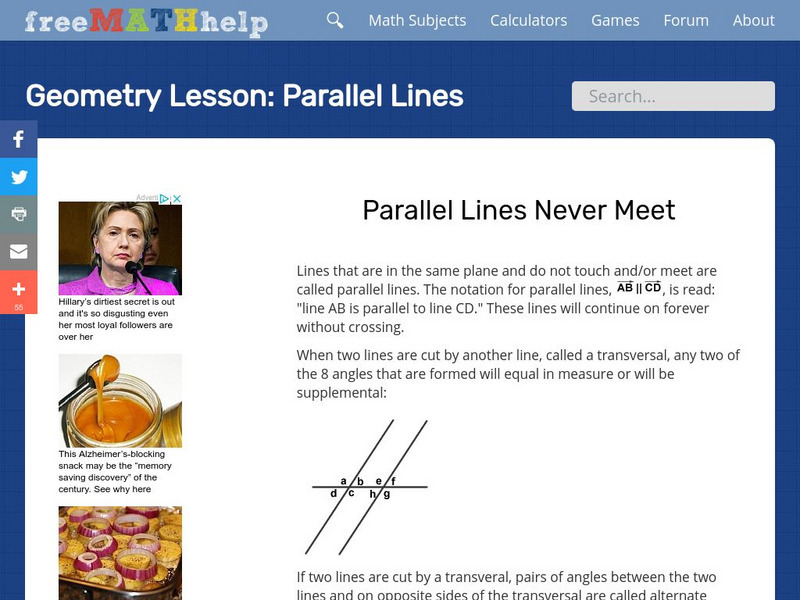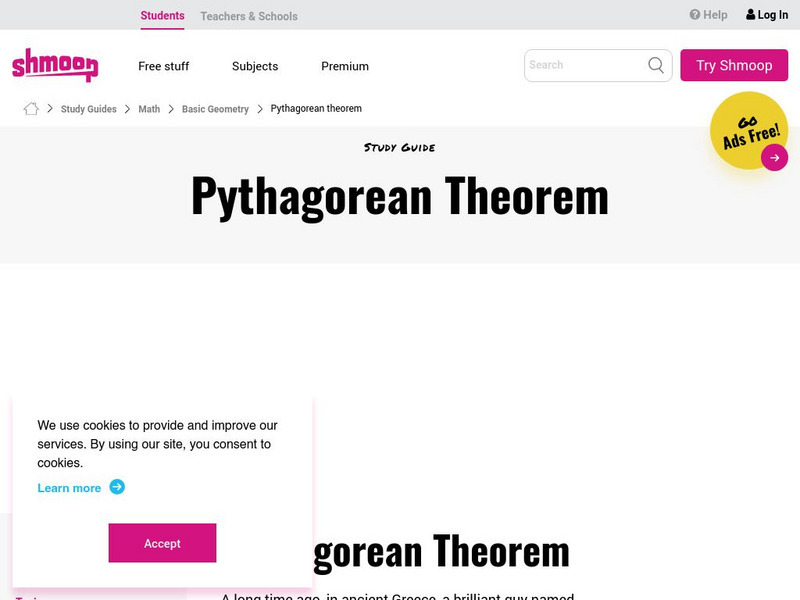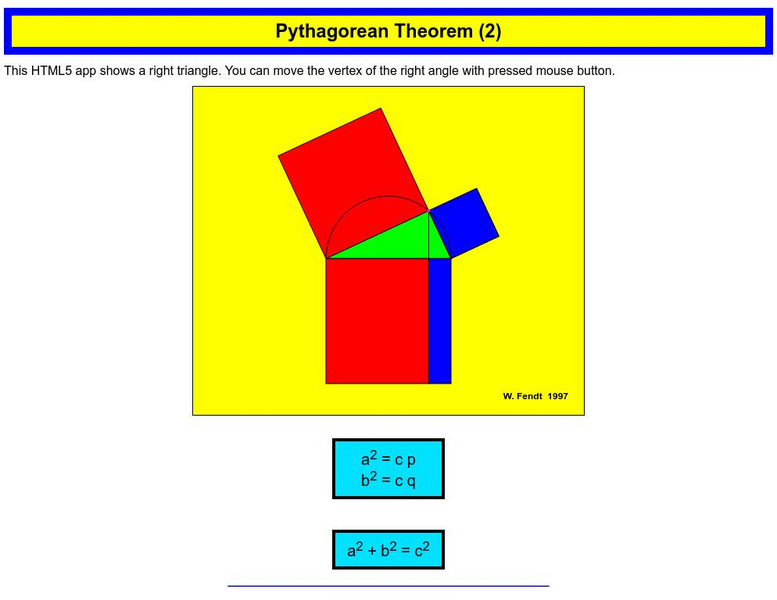CK-12 Foundation
Ck 12: Geometry: Dilation
[Free Registration/Login may be required to access all resource tools.] In this lesson, students learn to dilate a figure. Students examine guided notes, review guided practice, watch instructional videos and attempt practice problems.
CK-12 Foundation
Ck 12: Geometry: Dilation in the Coordinate Plane
[Free Registration/Login may be required to access all resource tools.] In this lesson, students dilate figures in the coordinate plane. Students examine guided notes, review guided practice, watch instructional videos and attempt...
Geometry Help
Geometry Help: Pythagorean Theorem
Explains the basic concept of the Pythagorean Theorem with step-by-step instructions and methods for solving specific problems on your own relating to this topic.
Geometry Help
Geometry Help: Intersecting Lines and Angles
Explains the basic concept of intersecting lines and angles with step-by-step instructions and methods for solving specific problems on your own relating to this topic.
Geometry Help
Geometry Help: What Are Parallel Lines in Geometry?
Explains the basic concept of parallel lines in Geometry with step-by-step instructions and methods for solving specific problems on your own relating to this topic.
Cuemath
Cuemath: Midpoint Theorem
A comprehensive guide for learning all about plane shapes with definitions and solved examples.
Khan Academy
Khan: Lesson 16: Part 2 Coordinate Geometry; Trigo and Radians; Complex Numbers
2 OF 2 FOR ADDITIONAL TOPICS IN MATH. Students will use the coordinate plane and equations of lines and circles to describe figures; create the equation of a circle given the figure or use the structure of a given equation to determine a...
CK-12 Foundation
Ck 12: Interactive Geometry: 7.7 Law of Cosines
Learn how the Law of Cosines uses the measure of angle C to provide an equation that relates the three sides of the triangle with angle C.
CK-12 Foundation
Ck 12: Interactive Geometry: 4.2 Theorems About Lines and Angles
Consider two parallel lines that are intersected by a transversal, and when it crosses the two others, many different angle pairs are formed. See the special properties of the angle pairs in this interactive.
Quia
Ixl Learning: Dilations
Brush up on your math skills relating to dilations then try some practice problems to test your understanding.
Geometry Help
Geometry Help: What Are Perpendicular Lines in Geometry?
Explains the basic concept of perpendicular lines with step-by-step instructions and methods for solving specific problems on your own relating to this topic.
Geometry Help
Geometry Help: Lines and Angles
Explains the basic concept of lines and angles with step-by-step instructions and methods for solving specific problems on your own relating to this topic.
Free Math Help
Free Math Help: Parallel Lines
The Geometry session explores parallel lines. Properties, definitions, and examples are included.
ClassFlow
Class Flow: Parallel Lines and Angle Relationships
[Free Registration/Login Required] Explore the relationships between parallel lines and the rules of angle measurements.
Shmoop University
Shmoop: Basic Geometry: Pythagorean Theorem
Students learn about the Pythagorean Theorem. Notes, practice problems, and examples are included in the geometry resource.
City University of New York
Lehman College: An Introduction to Lines
Use this site for two short lesson plans regarding Euclidean and Spherical lines. Intersecting and parallel lines are discussed. The lesson contains activities for two days of class.
Walter Fendt
Walter Fendt: Pythagorean Theorem (2)
A short interactive activity to visualize the Pythagorean Theorem.
Mathigon
Mathigon: Geometry: Transformations and Symmetry: Dilations
This lesson focuses on dilations, a dilation is a transformation that resizes a geometric shape, by making it bigger or smaller.
Wolfram Research
Wolfram Math World: Hyperbolic Geometry
Hyperbolic Geometry is discussed here with specifics on the lines in this geometry. The equations of the lines are represented as well as a desription of the lines. The site has links to other non-Euclidean Geometries.










